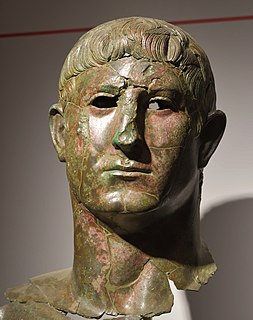Related Research Articles
Sextus Vettulenus Cerialis was a Roman senator and military commander. He was an early supporter of Vespasian, who appointed Cerialis suffect consul in either 72 or 73.
Lucius Nonius Calpurnius Torquatus Asprenas was a Roman senator who achieved the office of consul ordinarius twice, first under Domitian and later under Hadrian.
Gaius Laecanius Bassus Caecina Paetus was a Roman senator of the early Roman Empire, whose known career flourished under the reign of Vespasian. He was suffect consul in the nundinium of November to December AD 70 as the colleague of Lucius Annius Bassus.
Lucius Antistius Rusticus was a Roman senator active in the later part of the first century AD. He was suffect consul for March to April 90, with Lucius Julius Ursus Servianus as his colleague.
Tiberius Julius Candidus Marius Celsus was a Roman senator who lived during the Flavian dynasty. Contemporary sources, such as the Fasti Ostienses, the Acta Arvalia and a letter of Pliny the Younger, refer to him as Tiberius Julius Candidus. He was twice consul.
Lucius Venuleius Montanus Apronianus was a Roman senator of the first century. He was suffect consul for the nundinium of January to April AD 92 with Qunintus Volusius Saturninus, replacing the emperor Domitian.
Lucius Neratius Priscus was a Roman Senator and leading jurist, serving for a time as the head of the Proculeian school. He was suffect consul in the nundinium of May–June 97 as the colleague of Marcus Annius Verus.
Galeo Tettienus Severus Marcus Eppuleius Proculus Tiberius Caepio Hispo was a Roman senator active in the late 1st and early 2nd centuries AD, who occupied a number of offices in the imperial service. He was suffect consul around the year 101 as the colleague of Rubrius Gallus.
Quintus Pomponius Rufus was a Roman senator active in the imperial service; he was governor during the reigns of the emperors Domitian and Trajan. Rufus was also suffect consul for the nundinium September-December AD 95 as the colleague of Lucius Baebius Tullus. Pomponius Rufus is known primarily from inscriptions.
Publius Nonius Asprenas Caesius Cassianus was a Roman senator who was active in the first century. He was appointed suffect consul by Vespasian in either 72 or 73. Cassianus is known only through inscriptions. He is identified as the son of Publius Nonius Asprenas Calpurnius Serranus, ordinary consul of 38.
Lucius Valerius Propinquus was a Roman senator active in the second century AD. He was suffect consul who replaced the ordinary consul Marcus Annius Verus and was the colleague of the other ordinary consul, Gaius Eggius Ambibulus, for the remainder of the first nundinium of 126.
(Lucius?) Plotius Pegasus was a Roman senator and jurisconsult active under the Flavian dynasty. He was suffect consul in an uncertain year, most likely 72 or 73, as the colleague of Lucius Cornelius Pusio Annius Messalla. Shortly after his ascension to the imperial throne, Domitian appointed Pegasus urban prefect, one of the most prestigious offices in a senatorial career.
Senecio Memmius Afer was a Roman senator active in the last quarter of the first century AD. He was suffect consul for the nundinium of June to July AD 99 as the colleague of Publius Sulpicius Lucretius Barba. Afer is known primarily from inscriptions.
Lucius Roscius Aelianus Maecius Celer was a Roman senator of the second century. He was suffect consul in the nundinium of November-December AD 100 with Tiberius Claudius Sacerdos Julianus as his colleague. Celer is primarily known from inscriptions.

Lucius Cornelius Pusio Annius Messalla was a Roman senator under the Flavian dynasty who held several offices in the emperor's service. He was suffect consul in an uncertain year, most likely 72 or 73, as the colleague of Plotius Pegasus. The shorter form of his name is Lucius Cornelius Pusio.
Gaius Ummidius Quadratus Sertorius Severus was a Roman senator active during the second century AD. He was suffect consul in absentia for the nundinium of May to June 118 as the colleague of the emperor Hadrian. He is more frequently known by his shorter name, Gaius Ummidius Quadratus; his full name was known only after a missing piece to an inscription from Tomis was found.
Lucius Nonius Calpurnius Torquatus Asprenas was a Roman senator of the early Roman Empire, who flourished under the reigns of Nero and Vespasian. He was suffect consul around the year 78.
Titus Curtilius Mancia was a Roman senator, who held several offices in the emperor's service during the middle of the first century. He was suffect consul in the nundinium of November to December 55 as the colleague of Gnaeus Cornelius Lentulus Gaetulicus. No other senator with his gentilicium is known, so Mancia seems to have been a homo novus.
Marcus Annius Afrinus was a Roman senator, who held a number of offices in the emperor's service. He was suffect consul in July-August 66 with Gaius Paccius Africanus as his colleague. He is known primarily from inscriptions.
Lucius Calventius Sextus Carminius Vetus was a Roman senator, who was active during the reign of Trajan. He was suffect consul in the nundinium of September to October AD 83 as the colleague of Marcus Cornelius Nigrinus Curiatius Maternus. He is known entirely from inscriptions.
References
- ↑ Paul Gallivan, "The Fasti for A. D. 70-96", Classical Quarterly , 31 (1981), pp. 191, 217
- ↑ Fasti Potentini
- ↑ Gallivan, "Fasti for A. D. 70-96", p. 207
- ↑ AE 1915, 60
- ↑ IRT 516
- ↑ Eric Birley, "Review of Die Statthalter der Römischen Provinzen Nordafrikas von Augustus bis Diocletianus by Bengt E. Thomasson", Journal of Roman Studies , 52 (1962), p. 122
- 1 2 Syme, "Spaniards at Tivoli", Ancient Society, 13/14 (1982/1983), pp. 242f; Olli Salomies, Adoptive and polyonymous nomenclature in the Roman Empire, (Helsinki: Societas Scientiarum Fennica, 1992), p. 133
- ↑ Werner Eck, "Jahres- und Provinzialfasten der senatorischen Statthalter von 69/70 bis 138/139", Chiron , 12 (1982), p. 339